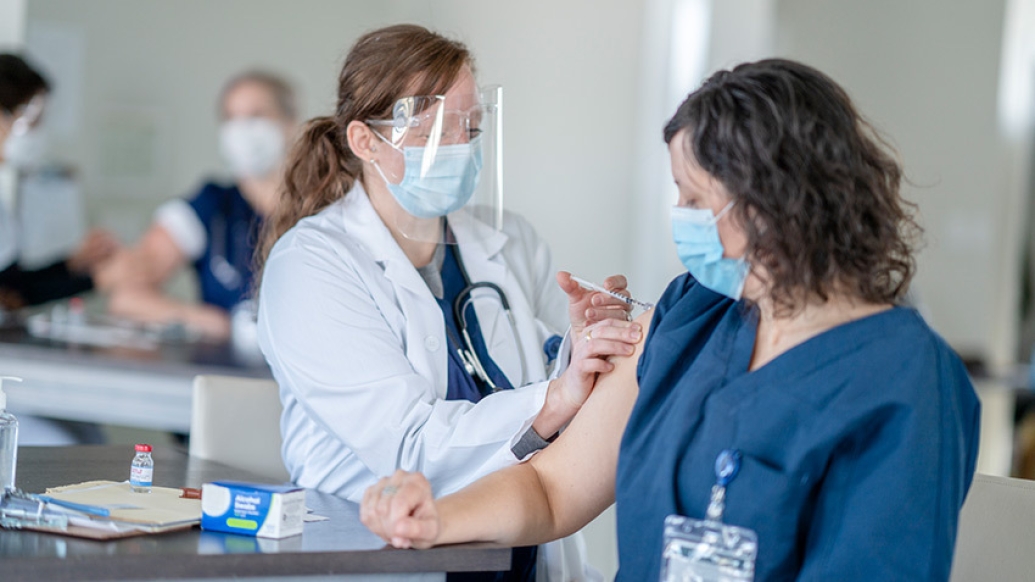Poll taken before new federal policy announced shows strong support across the board among people age 50 to 80, with some exceptions.
10:32 AM
Author |

A new poll finds strong support among older Americans for requiring health care workers to get vaccinated against COVID-19.
In all, 61% of people aged 50 to 80 say the vaccine should definitely be required for all health care workers. An additional 19% say it should probably be required. The remaining 20% said no to such a requirement.
The data comes from a national survey taken in August, when COVID-19 cases had begun to surge again in parts of the country, and the three vaccines available in the U.S. were all still under emergency use authorization from the United States Food and Drug Administration.
The data were also collected before the newly announced federal initiative that will lead to vaccination requirements for nearly all health care workers whose employers accept Medicare and Medicaid – estimated at 17 million people. The poll was conducted as part of the National Poll on Healthy Aging, based at the University of Michigan Institute for Healthcare Policy and Innovation and supported by AARP and Michigan Medicine, U-M's academic medical center.
SEE ALSO: Poll: Nursing Homes Should Require Flu Shots for All Staff and Patients
"As our country tries to get the coronavirus under control, it's important that health care employers and health providers hear the voices of those who are most likely to turn to them for help," says Preeti Malani, M.D., who directs the poll and is an infectious disease physician at Michigan Medicine as well as a professor at the U-M Medical School. "Those voices, overwhelmingly, are saying, 'Please get vaccinated to protect your patients and yourself.'"
Key findings from older adults polled on COVID vaccination requirements for health care workers:
-
Across the total poll sample, support for a health care worker vaccine requirement was mostly consistent between men and women, and across different levels of income, education, physical health and mental health.
-
Older adults who had already gotten vaccinated against COVID-19 – 80% of the 2,157-person sample – strongly supported a vaccine requirement for health workers. More than 91% of them said it should definitely or probably be required. Only 35% of the unvaccinated respondents said the same.
As our country tries to get the coronavirus under control, it's important that health care employers and health providers hear the voices of those who are most likely to turn to them for help.Preeti Malani, M.D.
-
75% of Black respondents said the vaccine should definitely be required for health workers, compared with 57% of white respondents and 65% of Hispanic respondents. Only 9% of Black older adults opposed a vaccine requirement, compared with 22% of whites and 18% of those of Hispanic background. The rest of each group said the vaccine should probably be required.
-
Age did make a difference, with a 20-point gap between respondents over and under age 65. In all, 72% of those aged 65 to 80 said the vaccine should definitely be required, compared with 52% of those aged 50 to 64. The remaining members of both age groups were almost evenly split between probably supporting a requirement and opposing one.
-
Employment status also mattered. People over 50 who are currently working were more likely to oppose a requirement for health workers (24%), compared with 17% of those who are retired or not working.
-
When the poll team looked at what region of the country respondents live in, the highest percentage of opposition to a requirement was in the Midwest, with 25% saying health care workers should not be required to get the COVID-19 vaccine. At the time of the poll, COVID-19 activity was highest in the South, and 82% of older adults there agreed that vaccination should definitely or probably be required for health workers.
Even as the federal vaccination requirement takes shape, many health care employers have been considering or implementing COVID vaccination requirements for their staff. Health care providers at the Veterans Health Administration's hospitals and clinics, and in all branches of the military, are already subject to a requirement. Meanwhile, 11 states have bans on vaccination mandates in place.
SEE ALSO: Some Healthcare Providers Among Those Hesitant About COVID-19 Vaccine
Many health care workers in many professions have already gotten vaccinated voluntarily and were among the first vaccinated in many states starting in December 2020.
The National Poll on Healthy Aging results are based on responses from a nationally representative sample of 2,157 adults aged 50 to 80 from the NORC AmeriSpeak panel who answered a wide range of questions online in August 2021. Questions were written, and data interpreted and compiled, by the IHPI team. Laptops and Internet access were provided to poll respondents who did not already have them. Read past National Poll on Healthy Aging reports

Explore a variety of healthcare news & stories by visiting the Health Lab home page for more articles.

Department of Communication at Michigan Medicine
Want top health & research news weekly? Sign up for Health Lab’s newsletters today!





